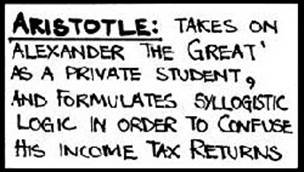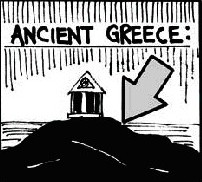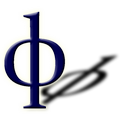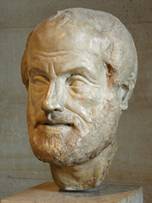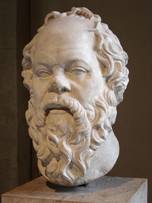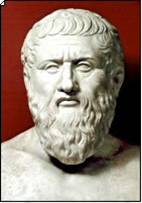Phil
 12-13: Socrates
12-13: Socrates
The aim of the class is that students become familiar with Socrates’ ethic principle (virtue is knowledge) and his life. How does Socrates’ life (470-399 BC) reflect in his philosophy? Live in harmony with maxim: To perceive yourself (Gnoti Sauton). How does Socrates differ from cosmological physicists? Why didn’t Socrates write a single book? In Plato’s dialogues Socrates was described as a sage who was occupied with constant interrogation of fellow townsmen and encouragement of them to live in a decent way. The hostility that he had provoked, led him to the court trial against him. How did Socrates defend himself in the Athens’ court? How much is the sacrifice present today for the sake of our own beliefs? Who is the wise man for Socrates? In the core of his philosophy is the question of good (agathon) and virtue (arete). What is the virtue for Socrates and how could it be gained? What is the sense of dialectics (Greek: dialogos), conversation? What does Socrates’ claim “I know that I know nothing” mean? What is the aim of life for Socrates? Can we use knowledge? The knowledge that Socrates searches for, is practical knowledge whose content is the insight of good and evil. Explain: Who were the Socrates’ students and what was their philosophy based on?
 Literature:
Literature:
- V. Korac, B. Pavlovic “The History of Philosophy”, Philosophy textbook for the 4th grade of grammar and vocational schools;
- Cekic, Savic, Cvetkovic “Philosophy”, Philosophy textbook for the 4th grade of grammar and vocational schools;
- Taylor, C.C.W. (2001). “Socrates: A very short Introduction”, Oxford, Oxford University Press;
- Plato “Socrates’ Defense”, “Theaetetus”, “Phaedrus”, ” Phaedo”;
- Aristotle “Metaphysics”;
- Xenophon “Memories about Socrates”;
- F. Copleston “A History of Philosophy”;
- G.W.H. Hegel “The History of Philosophy”;
- Karl Jaspers “The World’s History of Philosophy”.
Phil
 14-15: Plato
14-15: Plato
The aim is that students become familiar with Plato’s key philosophical ideas and the difference between his and philosophy of his tutor, Socrates. What did mostly influence on Plato (427-347 BC) to become philosopher? Get students familiar with Plato’s ontological basis of philosophy – the study about ideas. What are ideas for Plato? How does Plato explain ideas through the myth about the cave (visible world or the world of public opinion and invisible world or the world of ideas)? What is the public opinion and how does it exist today (virtual reality, massmedia)? How is the difference between the truth and public opinion expressed in pre-Socrates’ philosophy? Plato’s theory of knowledge refers to this difference. He sets three levels of knowledge: sensuality (faith – Greek: pistis, supposition – eikasia), intellect (dianoia) and mind (noesis). How does soul comprehend ideas? What is dialectics for Plato and how does it differ from Aristotle’s understanding of dialectics? Explain the ideal of Plato’s state theory through the unity of Greek man and polis. The structure of Plato’s state consists of: rulers, soldiers and manufacturers. Discuss your opinions about Plato’s rulers-philosophers. Students should explain the relation between politics and ethics now and before. How do they understand the expression “Platonic love”?
 Literature:
Literature:
- Plato “The Republic“, “Laws“, “Gorgias“, “Sophist“, “Parmenides“, “Phaedo“, “Theaetetus“;
- V. Korac, B. Pavlovic “The History of Philosophy“, Philosophy textbook for the 4th grade of grammar and vocational schools;
- Cekic, Savic, Cvetkovic “Philosophy“, Philosophy textbooks for the 4th grade of grammar and vocational
schools; - Alexander Nehamas “Virtues of Authenticity“, Princeton, 1998;
- F. Copleston “A History of Philosophy“;
- G.W.H. Hegel “The History of Philosophy“.
Phil
 16-17: Aristotle
16-17: Aristotle
The aim is that students become familiar with the basic assumptions of Aristotle’s philosophy, above all, his metaphysics and ethics. Aristotle (384-322 BC) was the most famous Plato’s student who founded his school of philosophy, Lyckye. In this school, students learnt by walking (peripatos). Aristotle made classification of sciences (theoretical, practical and poetic). Students should realize the difference between Plato’s and Aristotle’s metaphysics. What is metaphysics for Aristotle and what is the first reason of all existence? Explain the Aristotle’s theory of cause (causa formalis, causa materialis, causa eficiens and causa finalis). Also, define Aristotle’s relation between the current (energeia) and possible (dynamis). Aristotle established that difference in order to explain the possibility of change. On that basis, Aristotle made so-called special metaphysics (soul, world, god). Aristotle’s ethics is based on his book “Nicomachean Ethics”. The aim of Aristotle’s ethics is to be practical knowledge, but not theoretical. Theoretical knowledge (wisdom, Greek: sophia) is more suitable to gods than people. Man should live as a social being (zoon politikon). Therefore, he should develop his practical wisdom. To use practical wisdom means to live in harmony with virtues (arete): moderation, gentleness, impartiality, saving (the golden mean). In that sense, the aim of human life for Aristotle is happiness or bliss (eudaimonistic ethics). But, what is happiness? Is it hedonism or material wealth? Discussion. Aristotle’s answer is good by itself, that is, the ultimate good. Aristotle’s virtues’ classification: Intellectual (dianoethical) and ethic (voluntary). Aristotle determines a man as ‘the animal who knows what is good, and what is evil’. Why is man a rational animal? Why is he different from other beings?
 Literature:
Literature:
- Aristotle “Metaphysics”, “Politics”, “Physics”, “Nicomachean Ethics”;
- Slobodan Zunjic “Aristotle’s Henology”;
- Diogenes Laertius “Lives and Thoughts of Eminent Philosophers”;
- F. Copleston “A History of Philosophy”;
- V. Korac, B. Pavlovic “The History of Philosophy”, Philosophy textbook for the 4th grade of grammar and
vocational schools; - Cekic, Savic, Cvetkovic “Philosophy”, Philosophy textbook for the 4th grade of grammar and vocational schools;
- Adler, Mortimer J. “Aristotle for everybody”, New York:
- Macmillan. A popular exposition for the general reader (1978).
